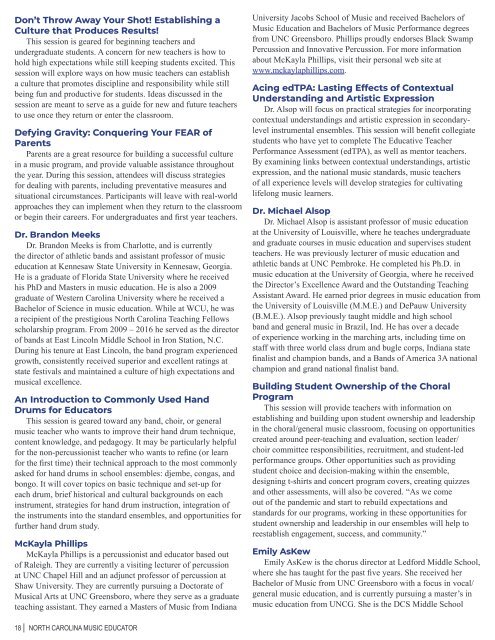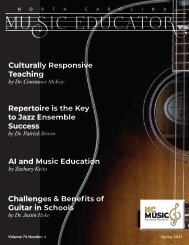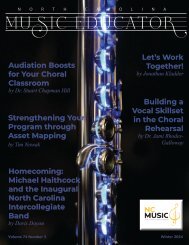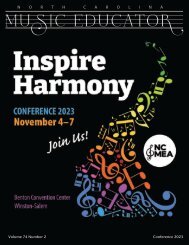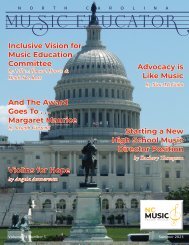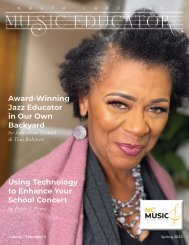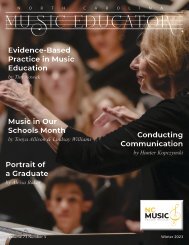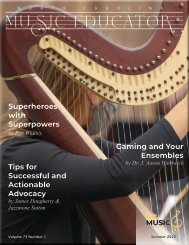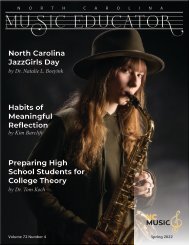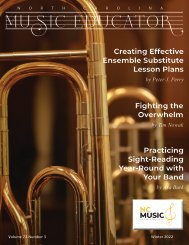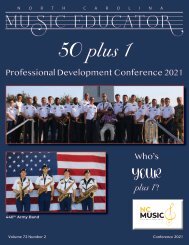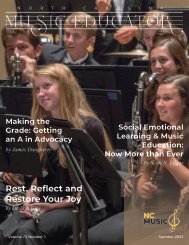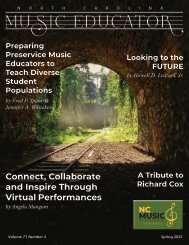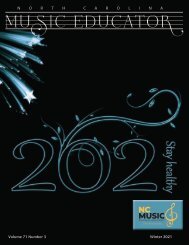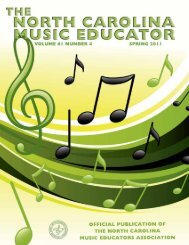NC Music Educator Conference Edition 2022
North Carolina Music Educators Association professional journal Conference edition 2022
North Carolina Music Educators Association professional journal Conference edition 2022
You also want an ePaper? Increase the reach of your titles
YUMPU automatically turns print PDFs into web optimized ePapers that Google loves.
Don’t Throw Away Your Shot! Establishing a<br />
Culture that Produces Results!<br />
This session is geared for beginning teachers and<br />
undergraduate students. A concern for new teachers is how to<br />
hold high expectations while still keeping students excited. This<br />
session will explore ways on how music teachers can establish<br />
a culture that promotes discipline and responsibility while still<br />
being fun and productive for students. Ideas discussed in the<br />
session are meant to serve as a guide for new and future teachers<br />
to use once they return or enter the classroom.<br />
Defying Gravity: Conquering Your FEAR of<br />
Parents<br />
Parents are a great resource for building a successful culture<br />
in a music program, and provide valuable assistance throughout<br />
the year. During this session, attendees will discuss strategies<br />
for dealing with parents, including preventative measures and<br />
situational circumstances. Participants will leave with real-world<br />
approaches they can implement when they return to the classroom<br />
or begin their careers. For undergraduates and first year teachers.<br />
Dr. Brandon Meeks<br />
Dr. Brandon Meeks is from Charlotte, and is currently<br />
the director of athletic bands and assistant professor of music<br />
education at Kennesaw State University in Kennesaw, Georgia.<br />
He is a graduate of Florida State University where he received<br />
his PhD and Masters in music education. He is also a 2009<br />
graduate of Western Carolina University where he received a<br />
Bachelor of Science in music education. While at WCU, he was<br />
a recipient of the prestigious North Carolina Teaching Fellows<br />
scholarship program. From 2009 – 2016 he served as the director<br />
of bands at East Lincoln Middle School in Iron Station, N.C.<br />
During his tenure at East Lincoln, the band program experienced<br />
growth, consistently received superior and excellent ratings at<br />
state festivals and maintained a culture of high expectations and<br />
musical excellence.<br />
An Introduction to Commonly Used Hand<br />
Drums for <strong>Educator</strong>s<br />
This session is geared toward any band, choir, or general<br />
music teacher who wants to improve their hand drum technique,<br />
content knowledge, and pedagogy. It may be particularly helpful<br />
for the non-percussionist teacher who wants to refine (or learn<br />
for the first time) their technical approach to the most commonly<br />
asked for hand drums in school ensembles: djembe, congas, and<br />
bongo. It will cover topics on basic technique and set-up for<br />
each drum, brief historical and cultural backgrounds on each<br />
instrument, strategies for hand drum instruction, integration of<br />
the instruments into the standard ensembles, and opportunities for<br />
further hand drum study.<br />
McKayla Phillips<br />
McKayla Phillips is a percussionist and educator based out<br />
of Raleigh. They are currently a visiting lecturer of percussion<br />
at U<strong>NC</strong> Chapel Hill and an adjunct professor of percussion at<br />
Shaw University. They are currently pursuing a Doctorate of<br />
<strong>Music</strong>al Arts at U<strong>NC</strong> Greensboro, where they serve as a graduate<br />
teaching assistant. They earned a Masters of <strong>Music</strong> from Indiana<br />
University Jacobs School of <strong>Music</strong> and received Bachelors of<br />
<strong>Music</strong> Education and Bachelors of <strong>Music</strong> Performance degrees<br />
from U<strong>NC</strong> Greensboro. Phillips proudly endorses Black Swamp<br />
Percussion and Innovative Percussion. For more information<br />
about McKayla Phillips, visit their personal web site at<br />
www.mckaylaphillips.com.<br />
Acing edTPA: Lasting Effects of Contextual<br />
Understanding and Artistic Expression<br />
Dr. Alsop will focus on practical strategies for incorporating<br />
contextual understandings and artistic expression in secondarylevel<br />
instrumental ensembles. This session will benefit collegiate<br />
students who have yet to complete The Educative Teacher<br />
Performance Assessment (edTPA), as well as mentor teachers.<br />
By examining links between contextual understandings, artistic<br />
expression, and the national music standards, music teachers<br />
of all experience levels will develop strategies for cultivating<br />
lifelong music learners.<br />
Dr. Michael Alsop<br />
Dr. Michael Alsop is assistant professor of music education<br />
at the University of Louisville, where he teaches undergraduate<br />
and graduate courses in music education and supervises student<br />
teachers. He was previously lecturer of music education and<br />
athletic bands at U<strong>NC</strong> Pembroke. He completed his Ph.D. in<br />
music education at the University of Georgia, where he received<br />
the Director’s Excellence Award and the Outstanding Teaching<br />
Assistant Award. He earned prior degrees in music education from<br />
the University of Louisville (M.M.E.) and DePauw University<br />
(B.M.E.). Alsop previously taught middle and high school<br />
band and general music in Brazil, Ind. He has over a decade<br />
of experience working in the marching arts, including time on<br />
staff with three world class drum and bugle corps, Indiana state<br />
finalist and champion bands, and a Bands of America 3A national<br />
champion and grand national finalist band.<br />
Building Student Ownership of the Choral<br />
Program<br />
This session will provide teachers with information on<br />
establishing and building upon student ownership and leadership<br />
in the choral/general music classroom, focusing on opportunities<br />
created around peer-teaching and evaluation, section leader/<br />
choir committee responsibilities, recruitment, and student-led<br />
performance groups. Other opportunities such as providing<br />
student choice and decision-making within the ensemble,<br />
designing t-shirts and concert program covers, creating quizzes<br />
and other assessments, will also be covered. “As we come<br />
out of the pandemic and start to rebuild expectations and<br />
standards for our programs, working in these opportunities for<br />
student ownership and leadership in our ensembles will help to<br />
reestablish engagement, success, and community.”<br />
Emily AsKew<br />
Emily AsKew is the chorus director at Ledford Middle School,<br />
where she has taught for the past five years. She received her<br />
Bachelor of <strong>Music</strong> from U<strong>NC</strong> Greensboro with a focus in vocal/<br />
general music education, and is currently pursuing a master’s in<br />
music education from U<strong>NC</strong>G. She is the DCS Middle School<br />
All-County Chorus coordinator, and <strong>NC</strong> ACDA MiddleFest<br />
co-coordinator. She serves on the <strong>NC</strong>MEA Middle School<br />
Choral Board, and is the artistic director and conductor for the<br />
Lexington Youth Chorus. She taught chorus and general music in<br />
Union County 2017 – 2018, and student taught chorus at South<br />
Asheboro Middle School in 2016. She also has several years of<br />
experience teaching private voice and piano lessons, as well as<br />
musical theater.<br />
Strategies for Passing the Praxis<br />
Dr. Ran Whitley’s Strategies for Passing the Praxis, will<br />
provide insight into strategies for preparing to take the <strong>Music</strong><br />
Praxis II, including how the test is constructed, how the test is<br />
scored and particular content areas most essential for review as<br />
the collegiate student approaches taking <strong>Music</strong> Praxis II. The<br />
session will review historical test statistics, sample multiple<br />
choice questions and sample constructed response questions, as<br />
well as resources to facilitate subsequent review. The ultimate<br />
goal of this session is to help alleviate apprehension and anxiety<br />
among collegiate students as they develop a practical personal<br />
strategy for taking and passing <strong>Music</strong> Praxis II.<br />
Dr. Ran Whitley<br />
Dr. Ran Whitley is a professor of music education at Campbell<br />
University, Buies Creek, where he holds the Alma Dark Howard<br />
Endowed chair of music. His course offerings include music<br />
theory, elementary music methods and children’s music ministry.<br />
He earned the DM in music ministry from Southeastern Baptist<br />
FOLLOW YOUR<br />
PASSION<br />
The Guilford College<br />
<strong>Music</strong> Department offers<br />
degrees in voice, piano,<br />
guitar, strings, woodwinds,<br />
brass, and percussion, plus<br />
degree tracks in classical,<br />
jazz, and recording/<br />
production.<br />
For more information, contact<br />
Department Chair Drew Hays<br />
at haysa@guilford.edu.<br />
DEPARTMENT of MUSIC<br />
Theological Seminary, as well as a Ph.D. in music education from<br />
U<strong>NC</strong> Greensboro. He holds current teacher licensure in North<br />
Carolina in both <strong>Music</strong> Education (K – 12) and ESL (K – 12).<br />
His Orff training includes Orff Levels I – III and the Orff Master<br />
Class from the University of Memphis. He has over 45 years of<br />
experience in elementary music including public school teaching,<br />
children’s music ministry, theory/counterpoint instruction and<br />
teacher education.<br />
Trauma Informed Pedagogy for <strong>Music</strong> Teachers<br />
This session will focus on practices that can help a student<br />
re-engage with musical learning and experiences. What does it<br />
mean when a student in your classroom acts out in class? Are<br />
they misbehaving, challenging us, or are they telling us about<br />
something they need? The answers to these questions are often<br />
quite surprising. According to the Substance Abuse and Mental<br />
Health Services Administration (SAMHSA), more than two thirds<br />
of children report having at least one traumatic experience by<br />
the time they reach the age of 16. At least one in seven children<br />
have experienced child abuse and/or neglect in a given year, and<br />
about one in five report being bullied on school property. These<br />
statistics tell us educators must learn about trauma, its impact on<br />
students’ lives and learning, and how to respond to trauma when<br />
we recognize it in our classrooms.<br />
Dr. Katy Strand<br />
Dr. Katy Strand is the Dottie Sink Sykes Distinguished<br />
Endowed Professor of <strong>Music</strong> Education. She taught K – 12<br />
WWW.GUILFORD.EDU<br />
18 | NORTH CAROLINA MUSIC EDUCATOR Guilford College <strong>Music</strong> Dept_<strong>Music</strong>EdJournal_Ad <strong>2022</strong>.indd 1<br />
NORTH CAROLINA MUSIC 8/24/<strong>2022</strong> EDUCATOR 10:30:01 | AM 19


